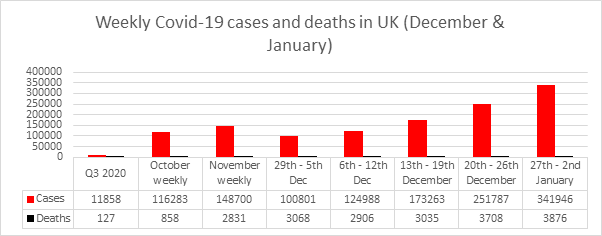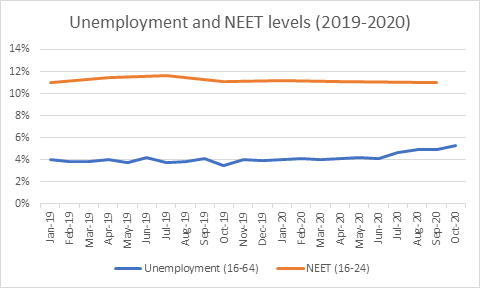This is the thirty-ninth of a series of bulletins produced by ISE to update members on key data and policy on Covid-19. We took a break over the Christmas period and so this bulleting covers the period 17/12/2020-6th January. Sadly, the virus did not take a break over Christmas and so a lot has happened since our last bulletin.
You can access all of the Covid-19 bulletins on ISE insights.
Latest Covid-19 data

Data taken from Wikipedia and from the government’s Covid-19 dashboard.
The UK has now had over 2.7 million identified Covid-19 cases and 82,624 deaths (with Covid on the death certificate). The R rate is estimated to be between 1.1 and 1.3 with the daily infection rate growing by 1%-6%. The number of cases seems to be continuing to climb, which has necessitated the new lockdown.
Covid news
- England has entered its third period of national lockdown. This will most likely last until March at the earliest. Other UK nations have also taken similar approaches. Devi Sridhar argues that we need to get this one right.
- European states have banned travel from the UK.
- After rapid development and approval the vaccine rollout is underway in the UK, but there are concerns about the speed that things are progressing at.
Education
- All schools are now teaching online until mid-February. Several broadband providers are offering free broadband for schools during this period. This follows on from a year of intense disruption in schools during 2020. This will have a worrying impact on human capital and social mobility.
- GCSE, A level and SATS exams will be cancelled this year and replaced with teacher assessment.
- Apprenticeship numbers have been falling since 2011 and this has been exacerbated by Covid.
- Universities are also mainly teaching online until mid-February. Covid has speeded up existing trends for students to study more locally.
- The government have promised £100 million for a new overseas study scheme to replace ERASMUS. But will this new scheme be good enough asks Nabil Ali?
- New international report shows how countries are managing career guidance during the pandemic. Tristram Hooley suggests some New Year’s Resolutions for the UK government’s career guidance policy.
The economy
- The economic impact of the crisis has been highly variable across the world. The UK economy continues to report depressed growth. A ‘long U-shaped’ recovery now seems the most likely outcome.
- Covid has exacerbated existing inequality in society.
- The hospitality sector has been unimpressed with the support that the government has provided for it in the latest lockdown.
The labour market

This figure uses data from the Office for National Statistics to set out the proportion of the working population who are unemployed and the proportion of young people who are Not in Education, Employment or Training (NEET).
- The government has launched its new Restart scheme to support the long-term unemployed back into work. But, the government has missed its own target to recruit 30,000 apprentices.
- There are concerns about the future of a wide range of youth organisations, many of which support education/business partnership and youth transitions to the labour market.
- Update on the graduate labour market.
Student recruitment
- What does lockdown 3 mean for student employers?
- The latest ISE podcast explores how Covid has impacted on early talent development. With all of the challenges HR professionals are going to have to make the case for early career recruitment in 2021. But it is not all bad according to Thames Water who argue that virtual assessment centres boost diversity.
- There is lots of practical advice around about how to respond to the challenges of lockdown and the pandemic. Including, how to support an intern during a pandemic and 15 things you need to know to run an effective digital assessment centre.
- Catch up on the ISE chair’s New Year’s message and look back on the Top 10 most read blogs on ISE: Insights and Tristram Hooley’s take on the worst things to happen to the sector during 2020.
Changes to working life
- How the pandemic will shape working life in 2021.


0 Comments